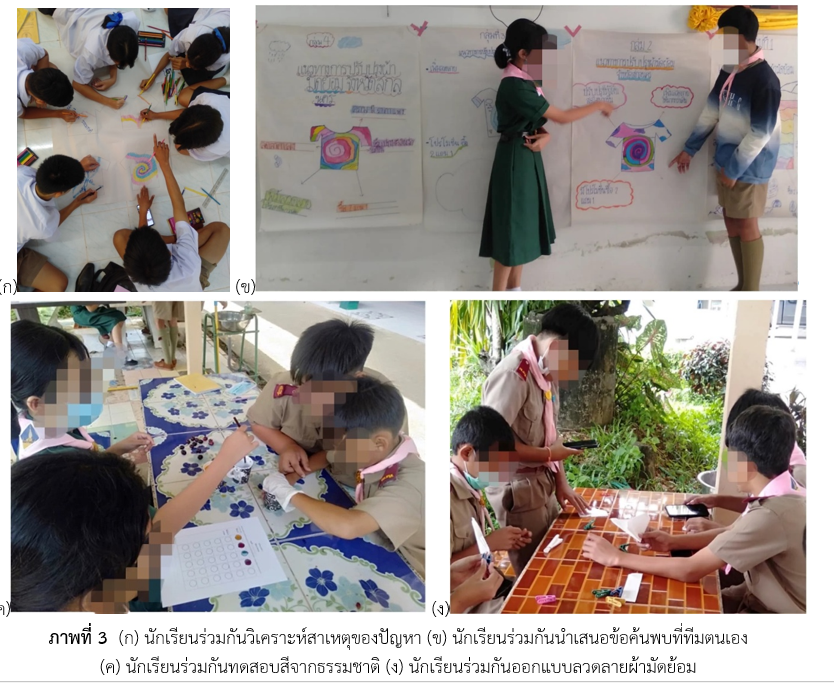การพัฒนาสมรรถนะการรวมพลังทำงานเป็นทีมของผู้เรียน โดยใช้การจัดการเรียนรู้ตามแนวทางของสะเต็มศึกษาแบบ 6E ร่วมกับโมเดลเศรษฐกิจบีซีจี สำหรับนักเรียนชั้นมัธยมศึกษาปีที่ 1 โรงเรียนชุมชนบ้านคำพอกท่าดอกแก้ว
Main Article Content
บทคัดย่อ
การวิจัยครั้งนี้มีวัตถุประสงค์เพื่อพัฒนาสมรรถนะการรวมพลังทำงานเป็นทีมของผู้เรียนสำหรับนักเรียนชั้นมัธยมศึกษาปีที่ 1 ที่ได้รับการจัดการเรียนรู้ตามแนวทางของสะเต็มศึกษาแบบ 6E ร่วมกับโมเดลเศรษฐกิจ บีซีจี เรื่อง ผ้ามัดย้อมคราม กลุ่มเป้าหมายคือ นักเรียนที่กำลังศึกษาชั้นมัธยมศึกษาปีที่ 1 ภาคเรียนที่ 1 ปีการศึกษา 2565 โรงเรียนแห่งหนึ่งในเขตอำเภอ ท่าอุเทน จังหวัดนครพนม จำนวน 26 คน เครื่องมือที่ใช้ในการวิจัยได้แก่ 1) แผนการจัดกิจกรรมการเรียนรู้ตามแนวทางของ สะเต็มศึกษาแบบ 6E ร่วมกับโมเดลเศรษฐกิจ บีซีจี จำนวน 5 แผน และ 2) แบบประเมินสมรรถนะการรวมพลังทำงานเป็นทีมของผู้เรียน จำนวน 29 ข้อ การวิเคราะห์ข้อมูลใช้ค่าเฉลี่ยและการเทียบกับเกณฑ์คุณภาพ ผลการวิจัย พบว่า ระดับพฤติกรรมของสมรรถนะการร่วมพลังทำงานเป็นทีมของผู้เรียนทั้ง 3 ด้านมีแนวโน้มเพิ่มขึ้น โดยมีค่าเฉลี่ยสูงที่สุดคือด้านการสร้างความสัมพันธ์ที่ดีและการจัดการความขัดแย้ง ( =2.98, SD=0.10) ถัดมาคือด้านกระบวนการทำงานร่วมมือรวมพลังอย่างเป็นระบบ (
=2.83, SD=0.24) สุดท้ายคือด้านการเป็นสมาชิกที่ดีและมีภาวะผู้นำ (
=2.65, SD= 0.18) และภาพรวมอยู่ในระดับดี (
=2.82, SD=0.17)
Article Details

อนุญาตภายใต้เงื่อนไข Creative Commons Attribution-NonCommercial-NoDerivatives 4.0 International License.
วารสารวิทยาศาสตร์และวิทยาศาสตร์ศึกษา (JSSE) เป็นผู้ถือลิสิทธิ์บทความทุกบทความที่เผยแพร่ใน JSSE นี้ ทั้งนี้ ผู้เขียนจะต้องส่งแบบโอนลิขสิทธิ์บทความฉบับที่มีรายมือชื่อของผู้เขียนหลักหรือผู้ที่ได้รับมอบอำนาจแทนผู้เขียนทุกนให้กับ JSSE ก่อนที่บทความจะมีการเผยแพร่ผ่านเว็บไซต์ของวารสาร
แบบโอนลิขสิทธิ์บทความ (Copyright Transfer Form)
ทางวารสาร JSSE ได้กำหนดให้มีการกรอกแบบโอนลิขสิทธิ์บทความให้ครบถ้วนและส่งมายังกองบรรณาธิการในข้อมูลเสริม (supplementary data) พร้อมกับนิพนธ์ต้นฉบับ (manuscript) ที่ส่งมาขอรับการตีพิมพ์ ทั้งนี้ ผู้เขียนหลัก (corresponding authors) หรือผู้รับมอบอำนาจ (ในฐานะตัวแทนของผู้เขียนทุกคน) สามารถดำเนินการโอนลิขสิทธิ์บทความแทนผู้เขียนทั้งหมดได้ ซึ่งสามารถอัพโหลดไฟล์บทความต้นฉบับ (Manuscript) และไฟล์แบบโอนลิขสิทธิ์บทความ (Copyright Transfer Form) ในเมนู “Upload Submission” ดังนี้
1. อัพโหลดไฟล์บทความต้นฉบับ (Manuscript) ในเมนูย่อย Article Component > Article Text
2. อัพโหลดไฟล์แบบโอนลิขสิทธิ์บทความ (Copyright Transfer Form) ในเมนูย่อย Article Component > Other
ดาวน์โหลด ไฟล์แบบโอนลิขสิทธิ์บทความ (Copyright Transfer Form)
เอกสารอ้างอิง
Burke, B. N. (2014). The ITEEA 6E Learning by designs model: maximizing Informed design and inquiry in the Integrative STEM classroom. Technology and Engineering Teacher, 73(6), 18-19.
Bybee, R. W. (1997). Achieving scientific literacy: From purposes to practices. Portsmouth, NH: Heinemann Publications.
Bybee, R. W. (2010). What is STEM education. Science, 329(5995), 996-996.
CBE Thailand. (2021). Competency - based education (in Thai). Retrieved 7 August 2022, from GoToKnow: https://cbethailand.com/หลักสูตร/หลักสูตรฐานสมรรถนะ/สมรรถนะหลัก-5-ประการ/สมรรถนะการรวมพลังทำงาน/นิยาม/
Chaumklang, S., Pilanthananond, N. and Srisa-ard, S. (2020). Development of appropriate management model for STEM education in Thailand (in Thai). KKU Research Journal (Graduate Studies) Humanities and Social Sciences, 8(1), 1–12.
Chung, C. C., Lin, C. L. and, & Lou, S. J. (2018). Chao Chung, C. Linag Lin, C. and Jer Lou, S. (2018). Analysis of the learning effectiveness of the STEAM-6E special course — A case study about the creative design of IoT assistant devices for the elderly. Sustainability, 10(3040). 1-16.
Janhaum, C. and Ketsing, J. (2021). Learning management according to the 6E learning STEM approach (in Thai). IPST magazine, 46(212), 32-36.
Jongluecha, P. (2022). Developing grade 3 student science learning achievement and scientific creativity using the 6E model in STEAM education. Journal of Educational Issues, 8(2), 142-151.
Kemmis, S. and McTaggart, R. (1988). The action research planner (3rd ed.). Australia: Deakin University Press.
Office of Education Council Thailand. (2017). In national education plan 2017 – 2036 (in Thai). Retrieved 10 January 2022, from GoToKnow: http://www.onec.go.th/index.php/book/BookView/1540
Phoodee, W. (2020). Mathematics instruction in digital age: Methods and tools (in Thai). Journal of Science and Science Education. 3(2), 190-199.
Phoodee, W. (2021). Instruction guidelines by integration of flipped classroom with 5E inquiry model using digital tools through a virtual classroom in teaching mathematics (in Thai). Journal of Science and Science Education. 4(2), 279-288.
Prarinthong, W. and Nuangchalerm, P. (2020). Development of modeling skill on entitled acid - base for year 11 students using model - based learning activity (in Thai). Journal of Education Rajabhat Maha Sarakham University, 17(3), 89-100.
Prasarn, O., Piemjard, W. and Duanyai, E. (2022). The development of community-based learning activity to promote higher order thinking, teamwork and collaborative competency for secondary school students (in Thai). Journal of Legal Entity Management and Local Innovation, 8(7), 13-32.
Rattanaphon, C., Tupthai, N., Kularb, U. and Thakoon, P. (2021). Urban agriculture and BCG economic model (in Thai). Journal of Agri. Research & Extension, 38(3), 100-116.
Ritcharoon, P. (2019). Scoring rubrics: The tool for teachers to accurately and fairly evaluate learning outcomes (in Thai). STOU Education Journal, 12(1), 1-16.
Saengsawang, S. and Chaipichit, D. (2021). The development of grade 11 students’ problem - solving ability in the physics subject of sound through the STEM education approach of 6E learning together with the use of multimedia (in Thai). Journal of Roi Kaensarn Academi, 6(6), 303–318.
Seeprasong, C., Prakongsup, T. and Puckdee, W. (2021). The development of grade 10th students’ scientific concepts of cell division and satisfaction through science, technology, engineering and mathematics (STEM) education by 6E learning cycle (in Thai). Silpakorn Education Research Journal, 13(1). 402-420
Somporn, P. (2021). BCG model and Thai vocational education (in Thai). CPNP Journal, 6(2), 13-22.
Srikoom, W., Hanuscin, D. L. and Faikhamta, C. (2017). Perceptions of in-service teachers toward teaching STEM in Thailand (in Thai). Asia - Pacific Forum on Science Learning and Teaching, 18(2), 1-23.
Srisaat, B. (2010). Preliminary research (7th edition). Bangkok : Suwiriyasan.
Tupsai, J. (2021). Integration STEM education for students’ competencies in the 21st (in Thai). Journal of Buddhist Education and Research, 7(2), 288–299.
Wongwanich, S. (2017). Classroom action research. Bangkok: Chulabook.
Yan, F., Yuxuan, Y., Wei, L., Chao, G. and Li, X. (2020). Exploring STEAM education activities based on project production — A case study on “the changeable road” project. Research Article in Physics Education Research, 5(1), 1-14.
Yokyong, S. and Pitiporntapin, S. (2019). Development of grade – 10 students’ argumentation skills through science, technology, engineering and mathematics (STEM) education by 6E learning cycle in topic of mission of environmental conservation (in Thai). Journal of Research Unit on Science, Technology and Environment for Learning, 10(2), 183-200.


